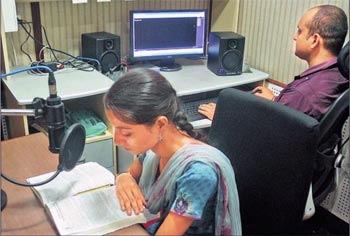Visually impaired children have to take recourse to braille in order to read. Still 60 such individuals in the city don’t have to use the method for studies, as they are making use of a talking library in the city.

Volunteers at the recording studio of the talking library at Sector 9, Chandigarh. HT-Photo
The noble concept was introduced in 2010 by Dr Amrik Singh Cheema Foundation Trust.
In a talking library, visually impaired individuals can listen to books instead of using braille (a method used by the blind to read words by placing their fingers on an embossed plate).
The books are audio recorded through a mike and made into an audio file. The recording is later edited and mastered for the students to listen.
These recordings are kept in an archive from where the children can listen to any book available.
The initiative taken by the trust has helped many blind children. “My mother started recording books for visually impaired children to improve the methods used to teach them,“ says Bani Cheema, executive director of the foundation.
The library became completely functional in 2010. Apart from the initiators, help is lent by volunteers who record curriculum books and then provide them free of cost in compact discs.
“I have been coming here for three years because I can get all my curriculum books recorded. Apart from costing lesser than braille papers, they are convenient. I can listen to them repeatedly, learning is easier through these audio books,“ says Shiv Kumar, a student of Panjab University pursuing MA in Hindi.
Technology has played an important role in helping blind individuals in the city use the facility. The library uses a software application to master the audio recordings. This equipment helps in omitting any unnecessary sounds. “The technology is such that we are able to get our books recorded in a month. It is recorded in a way that we can understand the pronunciation of each and every word,“ says Himanshu Garg, who is pursuing BEd, from the Government College of Education, Sector 20.
“I have been working in the USA with a vision to do something for special children. I conducted a research on a rare eye disease to understand the reasons behind loss of sight. As my family has always been attached to special students I was drawn to help them instantly,“ says Bani, who now thinks of expanding the library catering to more than 60 students.
“Many visually impaired students can learn better and faster by listening to the audio recordings. The library is open from 9.30am to 5.30pm on weekdays. We ensure that the chapters are audible and recorded in slow speed,“ says Jyoti Sharma, one of the voice recording specialists in the foundation.
The foundation is also thinking of getting a braille embosser and a special scanner to help visually impaired students.
